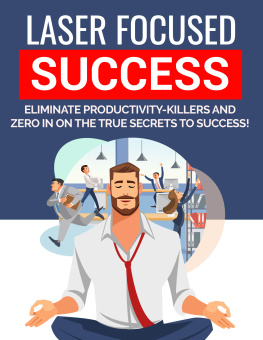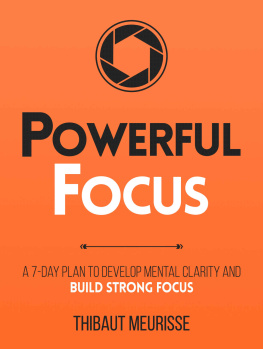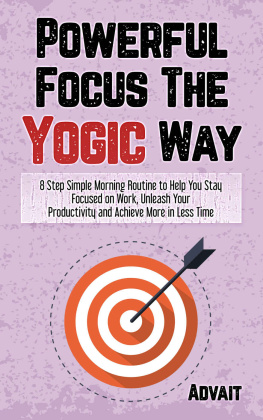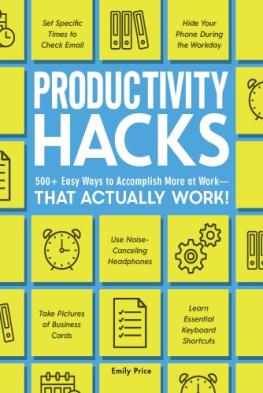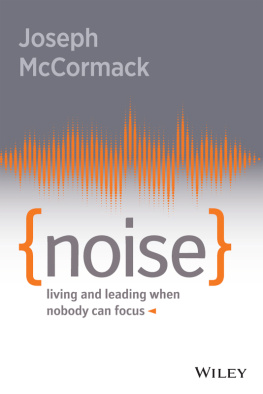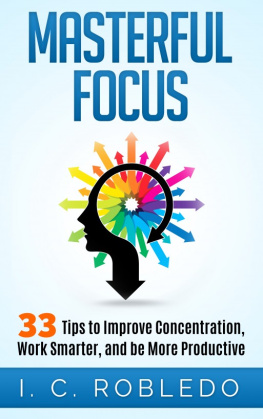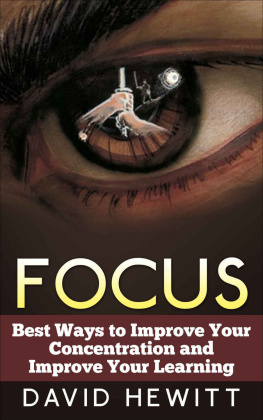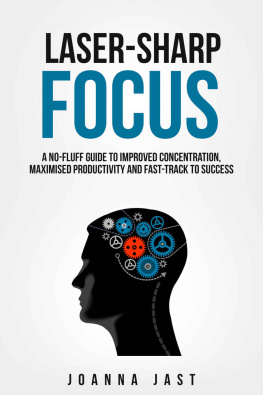Introduction
We live in an era of information overload. We are bombarded withmedia, technology, entertainment, and notifications every day. Itseems there are hundreds of people and things competing for yourattention at any given time. There is no wonder why in the last fewyears, our attention spans have become shorter and our ability tofocus has decreased.
Your time is valuable. Not being able to focus can have a negativeeffect on how successful we are at work and in our personal lives.Focus is a skill that we develop by training and practice.Productivity requires intention and strategy to help make your timework for you!
Lets begin by examining time killers that make us less productive.We will discuss tips and techniques to help improve your focus.Then lets create your plan will that will get you started onimproving your productivity now!
Indentify Focus Killers
Focus can only occur when we have said yes to one option and no toall other options, says James Clear in his article on Focus.
Time killers are activities that distract us from what we reallyneed to do. They dont contribute to helping us achieve our goals.
Time killing activities are noise. They are distractions thatkill our ability to focus. Laser focus requires to limit them asmuch as possible while you are working.
The key to focus is to choose one task to do and get rid of therest. Anything that is not essential for completing that task is adistraction.
To help you get started on your journey on maximizing productivity,lets identify those things that are distracting you fromcompleting your work.
Tomorrow morning when you start work, try taking a written (ormental) note of every time you stop from what you are currentlyworking on to do something, then come back to your work. Keep atally.
Once they are identified, lets write those activities down to putin our plan later. We will look for ways to set boundaries toprevent it from happening in the future. Here are a few examples ofthe most common distractions and how they affect our ability tostay focused.
Your Mobile Device/Phone
It is with you when you wake up, while you are driving, inmeetings, at dinner, and by your bedside at night. Our mobiledevices have become another appendage to our bodies. Some peoplefind it difficult to be away from their phones, even for a fewminutes. Constant notifications from apps and texts can quicklydistract you, causing a delay in getting your attention focusedback on the task at hand.
To help us be more aware of our phone usage, some mobile devices(like the iPhone) will track home many times you pick up your phonea day. This can be a scary number to see. Once you are aware of howmany times you pick up your phone to check notifications, you canstart making some adjustments to how often you pick up your phone.
Multi-Tasking
Some people use multi-tasking as a badge of honor to feelaccomplished. That person may feel that the busier they are, themore things they are getting done. The truth is we can work on morethan one thing at a time, just not as well.
When we can focus on one task at a time, we can give it our fullfocus. It takes time for our brains to switch between tasks whichresults in time wasted. Focus on the completion of tasks ratherthan getting many tasks done quickly. How often are youmulti-tasking? Write down if you feel multi-tasking helps you feelaccomplished.
Social Media Traps
Have you ever fallen into the rabbit hole of YouTube or become soengaged with Instagram that you found yourself there for hours? Ithappens often. The chemical rewards we get from our brain when weget likes and comments on our posts keep us engaged.
As consumers, we enjoy viewing the millions of videos and contentposted every day. However, if we are working this is a hindrance toour productivity. The best way to stop this time killer is to setboundaries for social media.
- Put time onyour calendar for checking/posting social media. maybe in theevening an hour before bedtime.
- Use the timelimit features on the apps to set daily time limits. This will helpyou realize when you are past your limit.
- Turn off yoursocial media notifications. Only check your social media duringyour scheduled time.
Putting Too Much on Your Calendar
Do you ever feel the need to fill up every time slot on yourcalendar? There is no reward in having a calendar full of events.Too much of a schedule can hinder your ability to complete the mostimportant things to get done for the day.
To limit distractions, make sure only essential events are placedon your calendar. A final product review with your team or doctorappointments are examples of events that are essential to attend.Most of us know the events we must attend. Allow the rest of thetime to work toward your goals. This gives you the flexibility tobe able to complete your tasks in however long it takes. Thisbrings us to the next big time killer!
Not Learning How to Say No
Many people struggle with approval addiction or have a difficulttime telling people no. This leads to having more things to put onyour schedule than you need or want. To start taking back yourtime, it means having to turn down invitations from people you careabout. Sometimes it means turning down meeting requests.
Your time and energy are valuable. If you dont respect it, thenother people will not either. The best thing to do is, to be honestwith them. Let me know you are working on an important project andwill get back in touch with them later.
It is hard to say no; however, it is a necessity when you need tofocus. Find ways to collaborate with others using methods likeemail, online conferencing or conference calls in place oftraditional meetings.
Do you have a time-waster not listed here? Make sure you jot thosedown in your plan so that you are mindful of them. Lets createbarriers around those distractions to help you stay focused oncompleting the important tasks of the day.
Focus Hacks
Here are a few important mind hacks to help you improve yourfocus for the day.
Taking Care of Yourself First
Our priority should be making sure we are whole healthy humanbeings. When our physical and mental health is declining, there isno way we can give our business our full potential. Here are someimportant self-care tips to improve your focus.
- Make sure you get enough rest (7-8hours of sleep). Your brain will not function at capacity whenyou are tired. While you sleep, your body can re-set and heal.
- Eat well-balanced meals. Healthysnacks help your brain function at its best. Try superfoods andincrease your amount of green leafy vegetables. Meal planning isextremely helpful as well as trying to go to the grocery store onlyonce a week. Use stores that offer online pickup or delivery forextra productivity points.
- Drink more water. Dehydration cancause loss of concentration and focus, according to a study at Georgia Tech. Most authorities recommend at leasteight 8-ounce glasses a day.
- Exercise regularly. Moderateexercise can increase alertness and energy that will help you bemore productive at work. Regular exercise is also important toprevent diseases that can cause you to miss out on work. If youcant make it to the gym, try taking the stairs at work. Aim for 30minutes a day at least 5 times a week.
- Spend some time outdoors. Being in nature helps us bring ourmind and body back into balance. Take a few minutes out of yourschedule to take a walk outside. Look at the trees, listen to somewater flowing, or just take in some sun.

